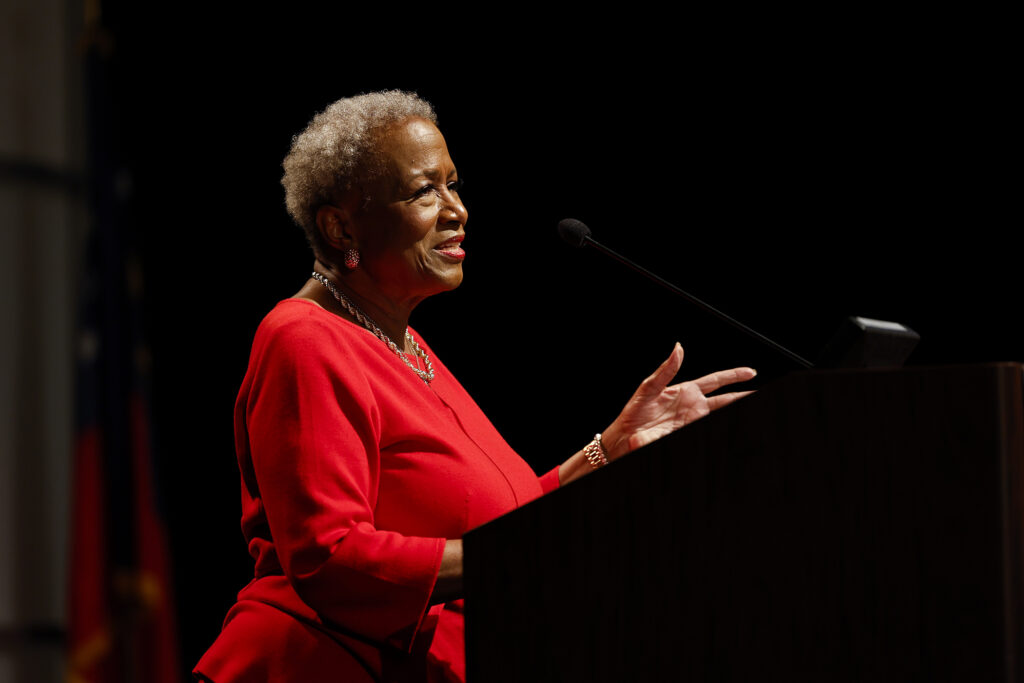Monica Pearson knows what makes a good story.
She blazed a trail as the first woman and first minority to anchor the daily evening news in Atlanta for WSB-TV, and she honored her friend and another trailblazer by delivering the 23rd annual Mary Frances Early Lecture, held Feb. 7 at the UGA Center for Continuing Education & Hotel.
“Mary Frances Early, you are no longer a footnote; you’re the headline,” Pearson said. “She ‘put up with’ so that this generation could ‘take advantage of.’ She and others like her knew one day that we would overcome.”
Pearson began by sharing three African proverbs, all on the importance of educating oneself. From Ethiopia: “He who learns, teaches.” From Guinea: “Knowledge is like a garden. If it’s not cultivated, it cannot be harvested.” From Somalia: “Wisdom does not come overnight.”
She spoke about the origin of Black History Month, which began in 1926 as Negro History Week by Carter G. Woodson. She pointed out that Black history is still American history.
“History made by people of color changed the world and changed the nation,” Pearson said. “When Black history is taught, it encourages students of all colors to dream of making history themselves.”
Pearson also said there is still more work to do.
“We need to learn to talk to each other. We need to learn to listen to each other. And last but not least, we need to learn to trust each other,” she said. “What we need to be doing is lifting everyone up.”
Pearson, who earned a master’s degree from the Grady College of Journalism and Mass Communication in 2014, also shared a bit about how she started on her own trail, from starting at a Black-owned radio station, to participating in the Summer Program for Minority Groups at Columbia University Graduate School of Journalism in 1969, to becoming the first African-American female anchor in Louisville, to beating out Jane Pauley and Oprah Winfrey for her position at WSB-TV.
“We have the ability to be a changemaker,” she said, “but we have to put in the work.”
Pearson pointed out that her journey and Early’s took grit and determination, but they were not defined by their circumstances.
“Not everyone has the opportunity to be made whole, to be made stronger, by challenging events, but I was,” said Early.

Monica Pearson, UGA President Jere W. Morehead and Mary Frances Early gather before the annual lecture named in Early’s honor. (Photo by Andrew Davis Tucker/UGA)
This year marks the 61st anniversary of Early’s graduation in 1962 as the first African American to earn a graduate degree from UGA.
“This lecture is a reminder to all of us of the progress we have made as an institution and an opportunity to honor a trailblazer, an educator and a dear friend of this university—Mary Frances Early,” said UGA President Jere W. Morehead. “Thank you for all that you have done and all that you continue to do to support the University of Georgia. Most especially, thank you for your courage, for your leadership, for your loyalty and for your strong friendship to this institution.”
The lecture series honors Early’s legacy and recognizes her dedication to making UGA an institution of higher learning for all people. It also strives to demonstrate the progress that has been made in achieving her vision as well as to identify the work that remains to be done.
“I am one of many who has benefitted directly from the sacrifices that she made when she left the University of Michigan in the summer of 1961 to become UGA’s first Black graduate student to pursue a master’s degree in music education,” said Ron Walcott, vice provost for graduate education and dean of the Graduate School. “Because of the trail that she blazed, I, along with many others, was able to earn my graduate degree from the University of Georgia.”
The Mary Frances Early Lecture, also designated as a Signature Lecture, is sponsored by the Graduate School, Graduate and Professional Scholars, the Mary Frances Early College of Education and the Office of Institutional Diversity.
“The history of desegregation in higher education, particularly in the South, is often a tale of perseverance, resolve, struggle and brilliance. But regardless of the details and the context, there is always an individual in the center of the story—an individual who dares to imagine a world that is different. A world where access and opportunity are available to everyone. At the University of Georgia, a central character in our story is Mary Frances Early. Her journey to desegregate this university is one of perseverance, resolve, struggle and brilliance. Yet, her contributions and value to the institution did not end when she walked on campus in 1961 or when she graduated a year later. She has continued to feed and pour into our community for decades,” said Michelle Cook, senior vice provost for diversity and inclusion and strategic university initiatives.
